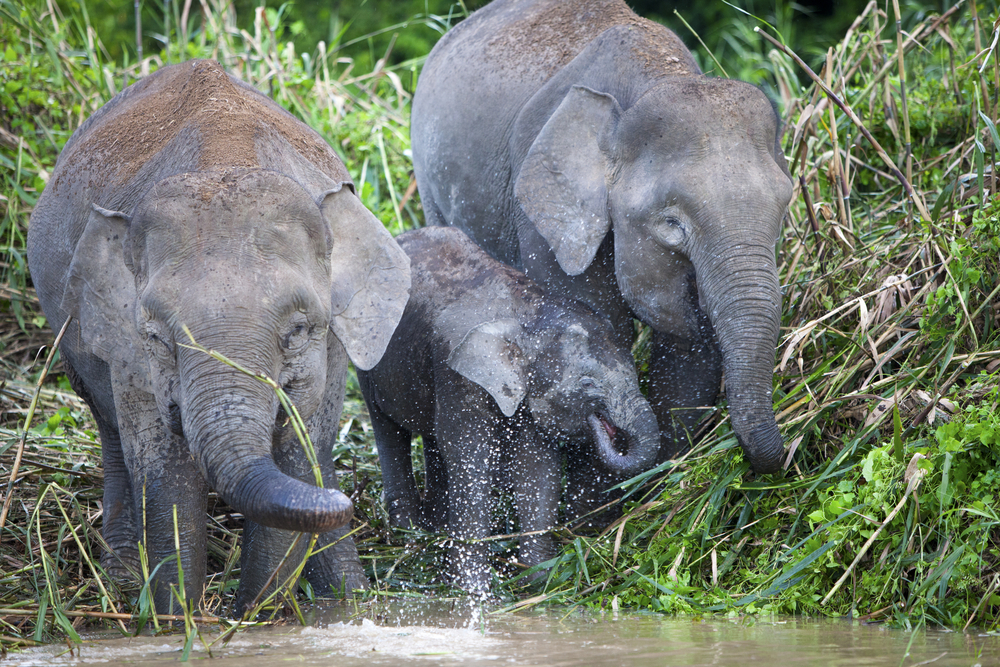
In the midst of Malaysia’s sweaty Sabah jungle, on the island of Borneo, an incredible encounter take place. Flora, a young pygmy elephant, approaches Englebert ‘Bert’ Dausip, a local wildlife ranger, and extends her trunk. Lacking an elongated proboscis of his own, Bert mimics the action with his arm, and the two characters connect, shaking and holding ‘trunks’.
Captured on film, this scene from Borneo’s Pygmy Elephants is an almost impossibly poignant moment. Elephants of all species are intensely tactile animals, constantly touching one another for reassurance and to express affection. This seemingly casual caress means Bert has been accepted by Flora, and although she is only about four years old, the rest of the group seem to accept her judgement of the strange bipedal creature who has been shadowing them unshakeably for days. The older females in the family—which is bossed by the matriarchs, as all pachyderm posses are—instantly warm to the human, and the mums and aunties show off their youngest calves to him, in a display of trust.
Bert has been following Flora and her family through the Borneo jungle and along the banks of the Kinabatangan River for some time. A skilled tracker, he climbed ‘listening trees’ to find them in the first place—because locating an elephant in the jungle is harder than you might expect—and then eavesdropped on their noisy chatter. When they move from one place to another during the night, he uses clues including dung droppings and the proliferation of butterflies that swarm around their fresh urine for the salt content, to trace their route along the river and through the trees.

Much smaller than their Asian cousins on the mainland, and with longer tails, bigger ears and rounder heads, these endangered animals are endemic to Borneo—in fact, they predominantly populate just the western part of Savah. They are also in severe danger of losing their struggle for existence, with vast swathes of the island’s rainforest being felled to make way for plantations, used to the produce the palm oil that is almost ubiquitous in products consumed in the West, from chocolate to bread.
Up until relatively recently, biologists believed that the pygmy pachyderms were an invasive species, runaway domestic elephants that had been given as gifts to the sultan of Sabah a few centuries ago and then escaped. Modern methodology put paid to that, with DNA collected by researchers like Bert revealing that the animals had actually been resident in Sabah’s rainforests for over 300,000 years.
To find out more about these enigmatic elephants, Bert was dispatched by the WWF and Sabah Wildlife Department to locate and spend extended time with a group. Braving leeches and horrific humidity, the ranger stuck to his task and fulfilled his brief brilliantly.
Bert began by keeping a polite distance between himself and the family—they might be small compared to their relations, but pygmy elephants can still be lethal if you anger them. Cautiously, though, he won their trust, and the friendship of Flora and her little companion Feisty, even if you young elephants did initially attempt to kung-fu kick him (check out the footage—very funny).

Building a special bond he witnessed (and the film captures) things that have never been seen or recorded by humans before, including the antics of a highly aroused and very aggressive lone bull elephant who gatecrashes the party and forces Bert to scramble up a tree, a massive extended family reunion of 50 elephants, hilarious interaction between orang-utans and elephants around a fruit tree, and the first days of life for a newborn baby elephant he calls Fig.
While Bert and the camera watch on, Fig is initiated to the Kinabatangan River, which will run through the middle of her life for another 70 years. Or maybe not. A logging barge is filmed going past, taking trees felled to make way for palm plantations that threaten the terrain and migratory routes of all these pygmy elephants. Is the end of these amazing animals’ narrative nigh, or will Bert’s painstaking field research pay off and win them the protection they need? Watch the film to find out.
Watch Borneo’s Pygmy Elephants right now, commitment free, with a 30-day free trial of Love Nature, for the best nature documentaries on the net.
